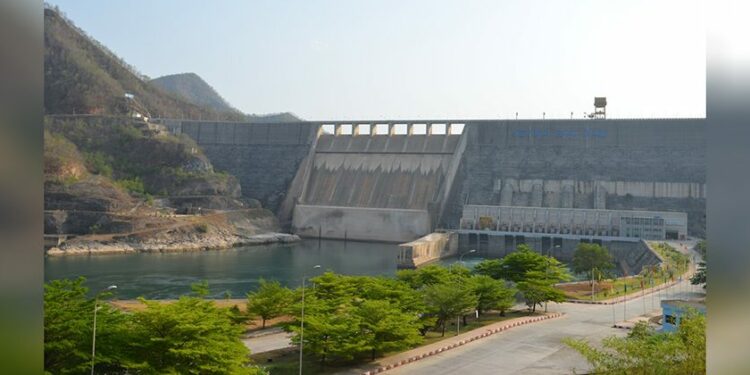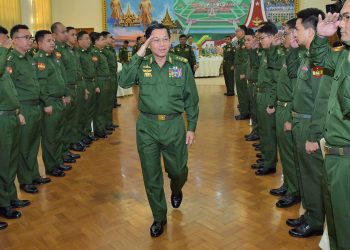YANGON—Two directors of the Hydropower Implementation Department under the Ministry of Electricity and Energy were arrested in Naypyitaw for abuse of power and accepting bribes from tender bidders relating to the design and construction of hydropower projects on the Myitnge River in Mandalay Region.
Myanmar’s Anti Corruption Commission (ACC) announced on Thursday it had opened cases against department director general U Chit Toe and director U Min Khaing at the No. 1 Myoma Police Station in Zabu Thiri Township, Phayakone Myoma Police Station in Ottara Thiri Township in Naypyitaw, and Pyigyitagon Myoma Police Station in Mandalay Region under Article 56 of the Anti-Corruption Law.
The commission said U Chit Toe’s department issued a taking-over certificate (TOC) to a company that won a tender to work on Section Three (Power House, Open Cut Work, Upper Party Excavation) of the Upper Yeywar hydropower project as part of the design and construction of the underground works, but failed to ask for delay damages, causing the state to lose income. The delay totaled 790 days, from May 6, 2017 (when the works should have been finished) to June 24, 2019, when the director general issued the TOC.
U Chit Toe failed to ask for damages amounting to 225,930.69 euros (378.5 million kyats) as required under the terms of the contract, as the project was supposed to be finished in May 2017, but was actually completed in May 2018, the commission said. Construction on the Upper Yeywar hydropower plant began in 2001 on the Myitnge River in Kyaukse Township, Mandalay Region.
The ACC also found that U Chit Toe received 71.5 million kyats from the company as a payment in exchange for hiring daily-wage laborers from the department, instead of using laborers from the company, which won tenders for two projects at the No. 3 Shwe Li hydropower project.
The ACC also said U Min Khine, the director of the Design Branch of the Department of Hydropower Implementation, asked for 31 million kyats from companies as a facilitating fee to ensure a contract was signed at more than the original price and to smooth the Financial Status Report (FSR) process for the electricity project, as well as for a foreign trip.
U Kyaw Soe, the ACC spokesman, told The Irrawaddy that “the inquiry found both directors engaged in corrupt acts, therefore they were charged under Article 56 [of the Anti-Corruption Law].” He added that the directors had been detained. The law prescribes a maximum 10-year prison sentence for political officeholders found guilty of corruption.
On Sept. 21, the ACC said during a press conference in Naypyitaw that it was investigating the Ministry of Electricity and Energy over complaints related to the Yeywar hydropower project, and not because of questions surrounding power meter tenders involving a military-backed company, an issue that had been raised in Parliament.
The ACC’s investigations have resulted in action being taken against a number of officials for misconduct and corruption under Article 56, including the arrests of former Tanintharyi Region Chief Minister Daw Lei Lei Maw and three officials from Global Grand Services Company in March; and the arrests of the managing director of No. 2 Mining Enterprise under the Ministry of Natural Resources and Environmental Conservation in April.
The ACC has detained and charged a number of officials under articles 55, 59 and 63 of the Anti-Corruption Law since it was founded in 2017. In May last year, it investigated alleged corruption by then Finance Minster U Kyaw Win. The minister resigned from his post, though the commission dropped the case in June 2018, as the complaints against him could not be substantiated.
In September 2018, a commission investigation led to the arrests of then Yangon Region Attorney General U Han Htoo and five others for corruption in connection with the high-profile murder case of comedian Aung Yell Htwe.
You may also like these stories:
Myanmar Energy Analysts Alarmed at Floating Power Plant Plans for Yangon
Myanmar’s Electricity Minister Reduces Workload Due to Illness
Energy Ministry Negotiates to Lower Fuel Oil Prices

















